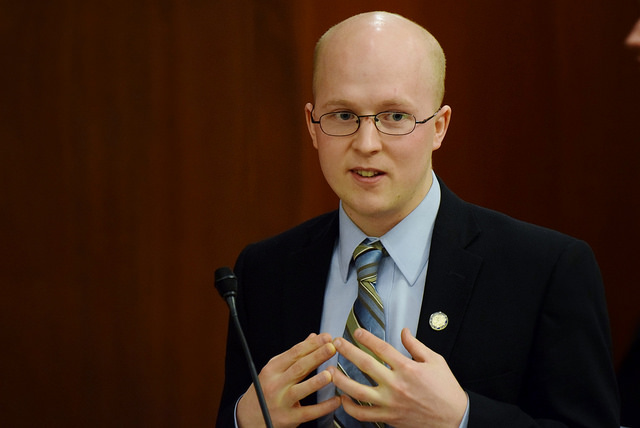Jonathan Kreiss-Tomkins thinks the state’s financial situation will mean a new reality for the state legislature in the upcoming session. The Sitka democrat is starting up his second term representing his hometown, along with Petersburg and 22 other small communities in central Southeast.
Declining oil prices have left the state with a big budget deficit and what Kreiss-Tomkins calls the equivalent of a financial apocalypse. “Things look bleak fiscally and I think that’s pretty much a universally-known fact,” Kreiss-Tomkins said. “And as far a legislation, probably the only legislation that are gonna move in the next two years are bills that don’t cost money or save the state money. The last two years we’ve been in a deficit situation but this is a completely different situation to the pre-2012 golden years of big surpluses. This is the polar opposite.”

Rep. Jonathan Kreiss-Tomkins addresses the Alaska House of Representatives, March 12, 2014. (Photo by Skip Gray/Gavel Alaska)
Kreiss-Tomkins expects spending cuts in the operating budget for state agencies and very few capital budget grants to local projects. The governor’s preliminary capital budget released in December had no funding for projects for any of the 24 communities in House district 35, and only had projects listed around the region and the state that could count on federal funding.
“That is about as extreme as you could get as far as taking a conservative approach to the capital budget,” he said. “And while ultimately I imagine some things, some very small things will be added to the capital budget, that, as best I can tell is what the new reality in Alaska’s gonna be for the budget process.”
Kreiss-Tomkins has signed on as a co-sponsor on a couple bills already filed before the session. One seeks to remove language in the state’s constitution limiting marriage to between one man and one woman. Another would prohibit discrimination because of sexual orientation or gender identity.
Kreiss-Tomkins said he’s thinking about introducing other legislation too. “We’re looking at a bill that’s gonna create low interest financing for public entities for energy efficiency improvements. That’s one thing in the hopper. We’re having a lot of conversations about improving access for Alaskans and Alaskan communities to fishing permits and creating an easier path into permit ownership and accessing commercial fisheries.”
Another top priority for the Sitka democrat is to address community concerns over the state’s plans to spray herbicides for weed control along state roadways in Southeast. There’s been opposition to those plans from Petersburg, northern Prince of Wales Island and Skagway. “And we have a bill being drafted right now that addresses what I see is this problem that DOT(Department of Transportation) is proposing to spray pesticides along public rights of way where people pick berries and catch fish and practice subsistence and that’s simply an unacceptable proposal to my mind. So we’re working with Representative Ortiz out of Ketchikan, the new representative from there for legislation that will create protections and create public process associated with this proposed spraying of pesticides, neither of which unfortunately exist right now.”
The state removed a permitting requirement in 2013, eliminating the public comment period for agencies seeking to spray chemicals on state land. Kreiss-Tomkins is also hoping the new Walker administration and new leadership in the Department of Transportation will reverse course and not pursue spraying for weed control along state roadways.
Kreiss-Tomkins said another big issue this session could be the latest attempt to move the legislative session out of the state capital. And he expects lawmakers to spend some time on the expansion of Medicaid. That was a campaign pledge by Governor Walker and it could extend health care coverage to 40,000 low-income Alaska residents.
“That’s gonna be an issue that’s gonna be pushed ahead and I imagine there will be some tension with part of the legislature and the governor on that,” Kreiss-Tomkins said. “I mean I think it’s hugely important. It’s especially important for rural hospitals so that they can reduce the charity care which amounts to hundreds of thousands if not millions of dollars that effectively gets subsidized by people who pay their bills and being able to insure the uninsured is a big step towards creating a more sustainable health care system.”
Kreiss-Tomkins will caucus with the house minority and will serve on the house education committee, along with fisheries, rules and state affairs. The first session of the 29th Alaska legislature starts up January 20th.











